Key takeaways:
- Eco-labeling helps consumers make informed choices about sustainable wines, but not all labels guarantee authenticity.
- Organic wine production promotes biodiversity, enhances soil health, and results in higher quality grapes.
- Choosing organic wines ensures purity and supports environmentally responsible practices, enhancing the overall drinking experience.
- Challenges in organic wine labeling include complex certification processes, consumer confusion, and misleading marketing claims.
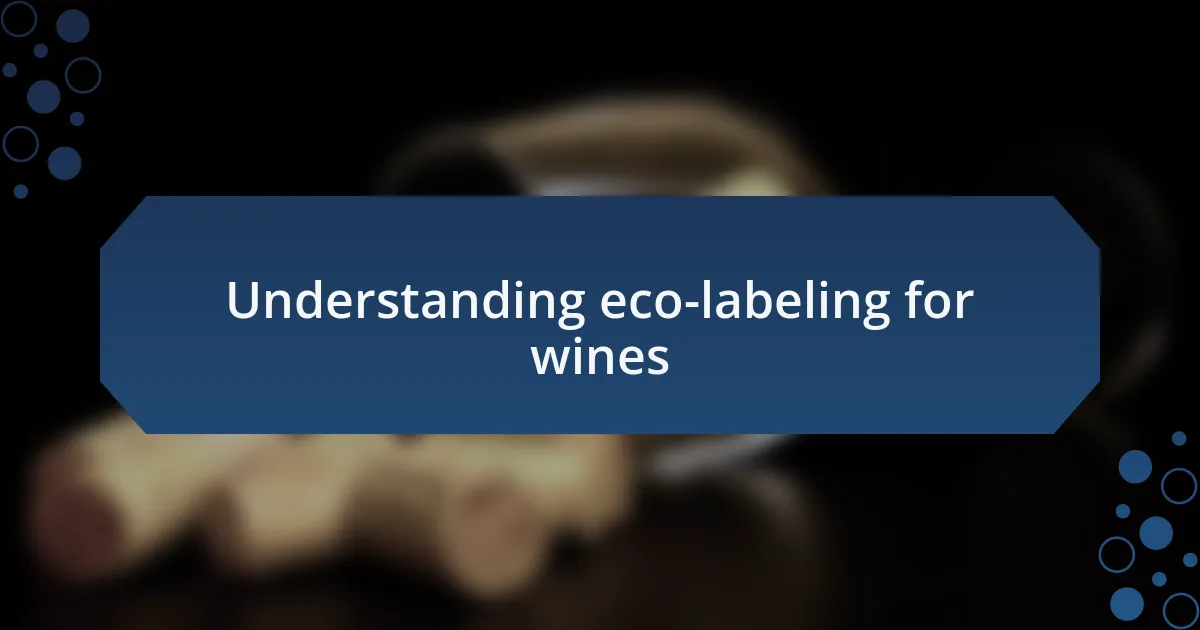
Understanding eco-labeling for wines
Eco-labeling in the wine industry serves as a guide for consumers who are increasingly conscious of their environmental impact. When I first discovered eco-labels on wine bottles, it sparked my curiosity about what went into the production process. It made me wonder, how can we know if a wine is truly sustainable just by looking at a label?
One crucial aspect of eco-labeling is that not all labels are created equal. Some are backed by rigorous certifications, while others may be more about marketing hype than genuine sustainability. I recall a particular wine tasting where the host proudly showcased a bottle labeled “natural.” I felt a mix of excitement and skepticism—was it really an eco-friendly choice, or just a clever catchphrase?
Understanding the specifics behind these labels can be a bit overwhelming, but it’s worth the effort. I often advise friends to look for certifications like “organic,” “biodynamic,” or “sustainable,” as these terms can provide meaningful insights into the wine’s cultivation methods. Isn’t it reassuring to know that with a little knowledge, we can make choices that align with our values while enjoying a great glass of wine?
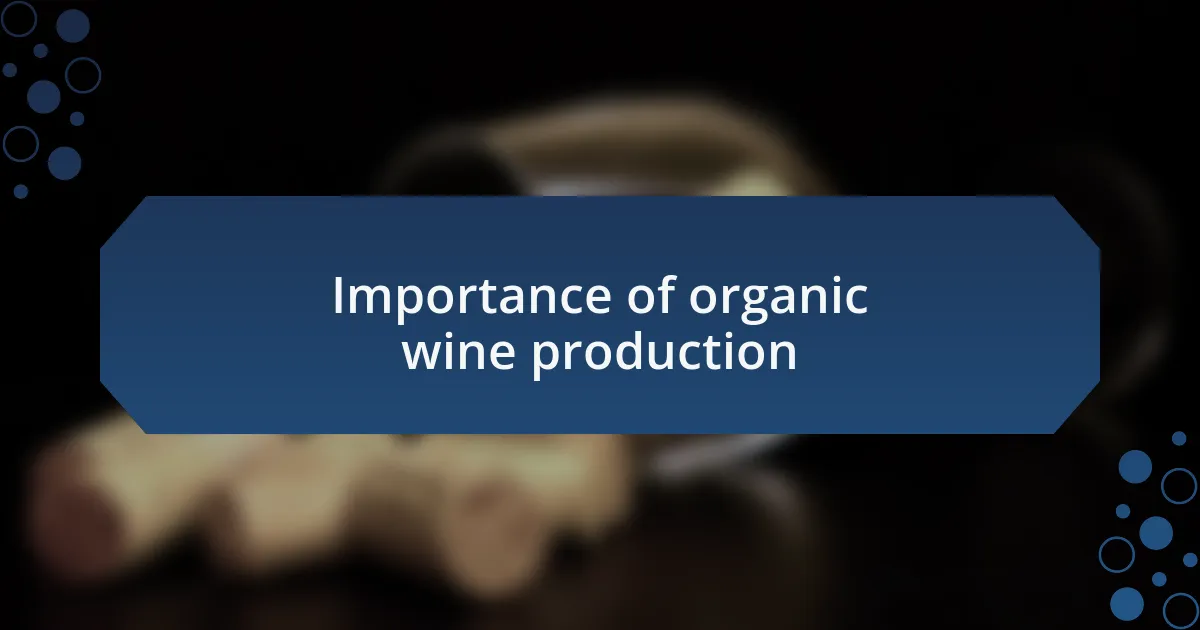
Importance of organic wine production
Organic wine production plays a vital role in sustainable agriculture. Personally, I’ve always believed that farming without harmful pesticides not only protects the land but also nurtures the biodiversity that surrounds it. Think of all the little creatures—bees, worms, and butterflies—that contribute to a thriving vineyard ecosystem. By opting for organic wines, we’re supporting practices that promote this harmony in nature.
Moreover, organic wine production often leads to higher quality grapes. I’ll never forget my first sip of an organic Merlot; it was like a burst of fresh, vibrant flavors that I hadn’t experienced in conventional wines. Isn’t it fascinating how the health of the vineyard can directly affect the taste of the wine? When producers emphasize organic methods, they’re not merely adhering to a trend but allowing nature to guide the flavors, resulting in a richer tasting experience.
Finally, choosing organic wine sends a powerful message. With every bottle I purchase, I feel I’m voting for environmentally responsible methods. There was a time when I felt overwhelmed by the sheer number of choices in the wine aisle, but now, when I reach for an organic label, I take pride in knowing my decision contributes to a larger movement. Doesn’t it feel good to enjoy something knowing it aligns with your values?
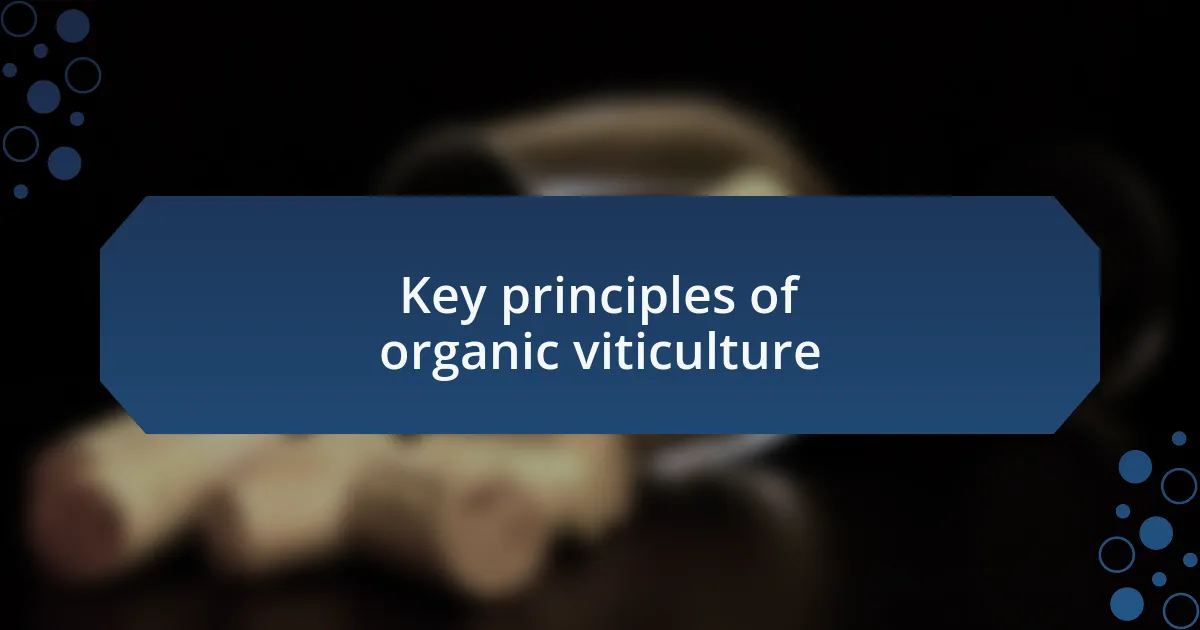
Key principles of organic viticulture
Organic viticulture is built on principles that emphasize sustainability and environmental stewardship. For me, the most compelling aspect is the use of natural farming methods. I recall visiting a vineyard where organic practices were in full swing—no synthetic fertilizers or harmful pesticides. Just the sound of nature buzzing around me, and the vibrant greenery felt alive and well. It made me realize how vital it is to respect and nurture the ecosystem in which grapevines thrive.
Another core principle is the promotion of soil health. Organic viticulture often employs cover crops and composting, which I learned from a winemaker friend, helps enrich the soil without artificial additives. When I first observed this process, the difference was palpable; the grapes seemed to have a more profound connection to their environment. Have you ever tasted a wine that reminded you of the land it came from? That’s the beauty of healthy soil—it truly captures the essence of the vineyard.
Finally, biodiversity is not just a buzzword; it’s a fundamental principle of organic viticulture. Planting a variety of plants and allowing natural predators to thrive supports a balanced ecosystem. I remember tasting a wine from a vineyard that embraced biodiversity; the complexity of flavors was striking. It’s fascinating to think how a diverse vineyard can yield not just healthier grapes but also create a wine that tells a much richer story. How comforting is it to know that our choices can support such vibrant ecosystems?
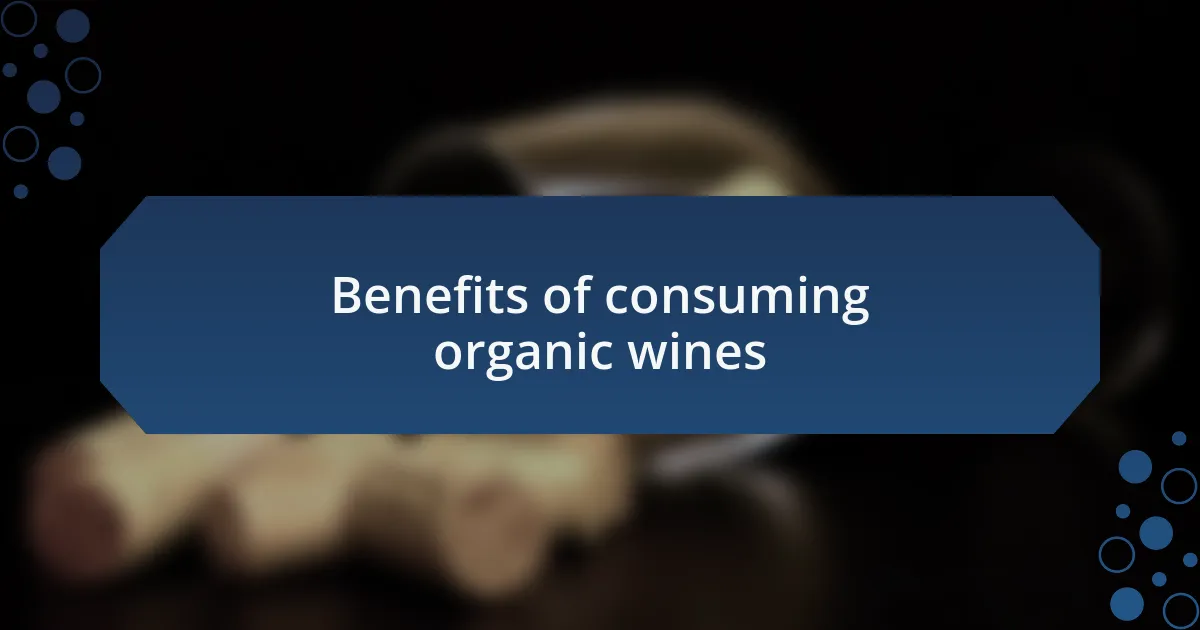
Benefits of consuming organic wines
Choosing organic wines comes with numerous benefits that go beyond just taste. One of the most profound advantages is the assurance of purity. I remember attending a tasting where the winemaker emphasized that their organic wines are free from synthetic additives. The moment I took a sip, I could truly appreciate the clean flavors— it was like a breath of fresh air! Don’t you think that drinking a wine crafted with care and integrity feels more rewarding?
Another significant benefit is the potential health aspect. While I’m not a nutritionist, I can share that many people are increasingly aware of what goes into their bodies. When I made the switch to organic wines, I noticed I had fewer headaches and less hangover after indulging. It feels reassuring to know that organic practices prioritize the use of natural processes and avoid harmful chemicals. Isn’t it comforting to feel good about what you’re drinking?
Lastly, organic wines often reflect a more authentic sense of place. I vividly recall discovering a vineyard nestled in a valley that employed organic methods. The wine I tasted captured the essence of that specific terroir— the unique soil, climate, and even the local flora. It made me think, how much more enriching is it to enjoy a wine that tells a story about its origin? The character and personality of organic wines can truly elevate the experience, creating a deeper connection between the drinker and the vineyard.
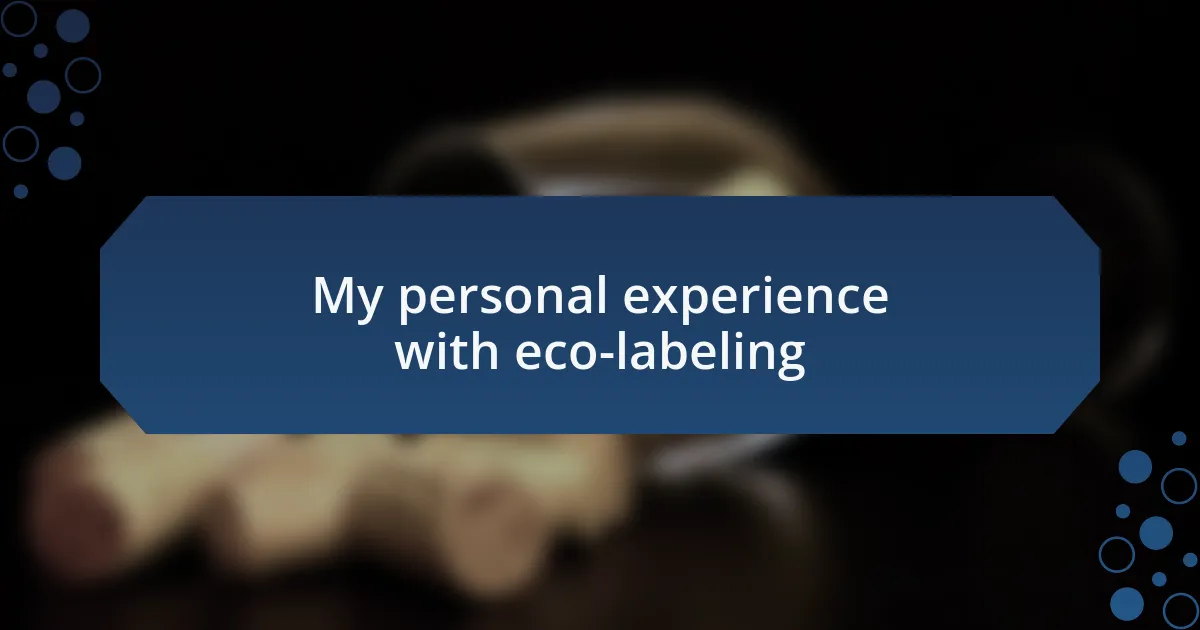
My personal experience with eco-labeling
When I first stumbled upon eco-labeled wines, it felt like opening a door to a new world. I remember being at a dinner party where a friend served a bottle adorned with an eco-label, proudly explaining that it was certified organic. I was intrigued—not just by the label, but by the promise it held. Have you ever felt that spark of curiosity when you realize there’s more to a product than meets the eye?
Trying that eco-labeled wine was more than a taste experience; it felt like an alignment of my values with my consumption choices. As I savored each sip, I couldn’t shake the thought of how my choice was supporting sustainable practices and preserving the environment. Knowing that each bottle was crafted with care gave my experience a layer of meaning that I hadn’t anticipated. It was almost like sharing a toast with nature itself—how often do we get that opportunity?
Since then, I’ve made it a habit to seek out wines that boast eco-labels. I recall visiting a local shop that specializes in organic products, and the wine section caught my eye. The range of choices was astonishing! Each bottle filled with stories of dedication to the earth made it feel like a mini adventure. Isn’t it wonderful how an eco-label can transform a simple bottle of wine into a celebration of nature’s bounty and a commitment to sustainability?
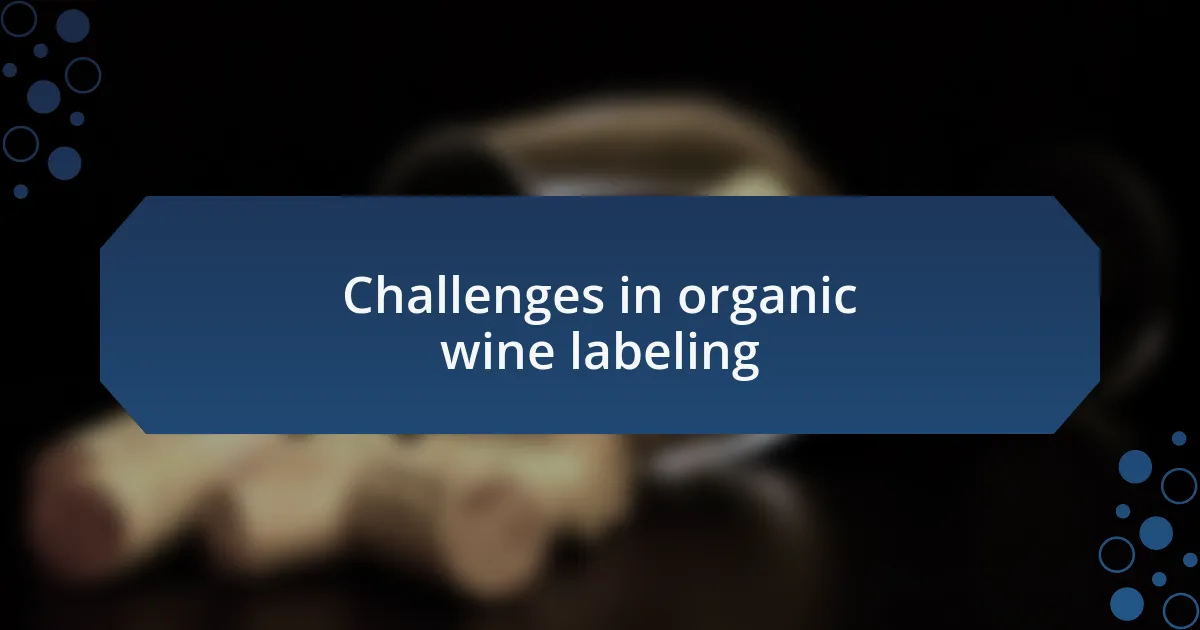
Challenges in organic wine labeling
Navigating the realm of organic wine labeling isn’t always a smooth journey. I remember attending a wine fair where I chatted with producers who were frustrated by the complexity of certification processes. It struck me how laborious it could be for smaller vineyards to meet stringent organic criteria while trying to maintain their unique identities. Have you ever considered how regulations can sometimes overshadow the artistry involved in winemaking?
Another hurdle I’ve observed is the confusion among consumers. At that same fair, I overheard guests debating the differences between various eco-labels and what each truly meant. This experience made me realize that while an eco-label can signify quality and sustainability, it can also lead to misunderstandings if the criteria are not clear. How can we, as consumers, make informed choices if we don’t fully grasp what these labels represent?
Additionally, there’s the issue of market saturation with misleading claims. I’ve seen wines that subtly hint at organic practices without the necessary certification. This makes it challenging for both consumers and producers who genuinely uphold organic standards. It made me question: how can we foster trust in a system where authenticity often gets clouded by marketing tactics?